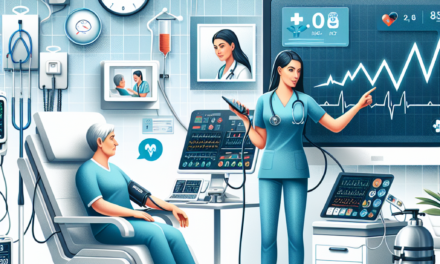Transforming Men’s Health: The Impact of Telemedicine on HGH Peptide Therapy Access
In recent years, the landscape of healthcare has undergone a significant transformation, particularly with the advent of telemedicine. This shift has been especially impactful in the realm of men’s health, where access to treatments such as Human Growth Hormone (HGH) peptide therapy has become more streamlined and efficient. This article delves into the various dimensions of this transformation, exploring how telemedicine is reshaping access to HGH peptide therapy, the benefits and challenges associated with it, and the implications for men’s health overall.
The Rise of Telemedicine in Men’s Health
Telemedicine has emerged as a vital component of modern healthcare, particularly in the wake of the COVID-19 pandemic. The necessity for remote consultations has accelerated the adoption of telehealth services, allowing patients to access medical care from the comfort of their homes. This trend is particularly significant in men’s health, where issues such as hormonal imbalances, sexual dysfunction, and overall wellness are often stigmatized, leading many men to avoid seeking help.
According to a report by the American Medical Association, telehealth visits increased by over 50% during the pandemic, with many patients expressing satisfaction with the convenience and accessibility of virtual consultations. This shift has opened new avenues for men seeking HGH peptide therapy, a treatment that can address various health concerns, including low energy levels, decreased muscle mass, and diminished libido.
Understanding HGH Peptide Therapy
HGH peptide therapy involves the use of synthetic peptides to stimulate the production of human growth hormone in the body. This therapy is often sought by men experiencing symptoms of aging or hormonal deficiencies. The benefits of HGH peptide therapy can include:
- Increased muscle mass and strength
- Improved energy levels
- Enhanced recovery from exercise
- Better sleep quality
- Improved mood and cognitive function
Traditionally, accessing HGH peptide therapy required in-person consultations with healthcare providers, which could be a barrier for many men. Telemedicine has changed this dynamic, allowing patients to consult with specialists remotely, thus increasing access to this important treatment.
Benefits of Telemedicine for HGH Peptide Therapy
The integration of telemedicine into men’s health has brought about numerous benefits, particularly for those seeking HGH peptide therapy. These advantages can be categorized into several key areas:
1. Increased Accessibility
One of the most significant benefits of telemedicine is the increased accessibility it provides. Men living in rural or underserved areas often face challenges in accessing specialized healthcare services. Telemedicine eliminates geographical barriers, allowing patients to connect with endocrinologists and other specialists regardless of their location.
For instance, a study published in the Journal of Clinical Endocrinology & Metabolism found that telemedicine consultations for hormone therapy were just as effective as in-person visits. This finding underscores the potential of telehealth to bridge the gap in healthcare access for men seeking HGH peptide therapy.
2. Convenience and Time Savings
Telemedicine offers unparalleled convenience for patients. Men can schedule appointments that fit their busy lifestyles without the need to travel to a clinic. This is particularly beneficial for those with demanding work schedules or family commitments.
Moreover, telemedicine reduces wait times associated with in-person visits. Patients can often receive consultations and prescriptions more quickly, allowing them to start their HGH peptide therapy sooner. This efficiency can lead to improved health outcomes, as timely treatment is crucial for addressing hormonal deficiencies.
3. Reduced Stigma and Increased Comfort
Men often face societal pressures and stigma surrounding health issues, particularly those related to hormonal imbalances and sexual health. Telemedicine provides a level of anonymity and privacy that can encourage men to seek help for conditions they might otherwise avoid discussing in person.
Research indicates that patients are more likely to disclose sensitive health information during virtual consultations. This openness can lead to more accurate diagnoses and tailored treatment plans, ultimately enhancing the effectiveness of HGH peptide therapy.
4. Comprehensive Care and Follow-Up
Telemedicine facilitates ongoing care and follow-up appointments, which are essential for monitoring the effectiveness of HGH peptide therapy. Patients can easily schedule follow-up consultations to discuss their progress, adjust dosages, or address any side effects they may be experiencing.
This continuity of care is crucial for optimizing treatment outcomes. A study published in the Journal of Telemedicine and Telecare found that patients who engaged in regular follow-up appointments via telemedicine reported higher satisfaction levels and better adherence to treatment protocols.
5. Cost-Effectiveness
Telemedicine can also be more cost-effective for both patients and healthcare providers. Patients save on travel expenses and time off work, while providers can reduce overhead costs associated with maintaining physical office spaces.
Additionally, many insurance plans have begun to cover telehealth services, making it more affordable for patients to access HGH peptide therapy. A survey conducted by the Kaiser Family Foundation found that 60% of respondents were more likely to use telehealth services if their insurance covered it, highlighting the financial benefits of this model.
Challenges and Limitations of Telemedicine in HGH Peptide Therapy
While telemedicine offers numerous benefits, it is not without its challenges and limitations. Understanding these obstacles is essential for both patients and healthcare providers as they navigate the evolving landscape of men’s health.
1. Regulatory and Legal Issues
The regulatory environment surrounding telemedicine can be complex and varies by state and country. In the United States, for example, laws governing telehealth practices differ significantly, which can create confusion for both patients and providers.
For HGH peptide therapy, specific regulations may dictate how prescriptions are issued and monitored. Providers must ensure they comply with these regulations to avoid legal repercussions, which can limit the availability of telemedicine services for certain treatments.
2. Technology Barriers
Access to technology is another significant barrier to telemedicine. Not all patients have reliable internet access or the necessary devices to participate in virtual consultations. This digital divide can disproportionately affect older men or those living in low-income areas.
A report from the Pew Research Center found that 25% of adults aged 65 and older do not use the internet, highlighting the need for alternative solutions to ensure all patients can access HGH peptide therapy.
3. Limited Physical Examination
Telemedicine inherently limits the ability to conduct physical examinations, which can be crucial for diagnosing certain conditions. While many aspects of HGH peptide therapy can be managed remotely, some patients may require in-person evaluations to assess their overall health and suitability for treatment.
Healthcare providers must balance the convenience of telemedicine with the need for comprehensive assessments. In some cases, a hybrid model that combines virtual consultations with occasional in-person visits may be the most effective approach.
4. Patient Engagement and Adherence
While telemedicine can enhance patient engagement, it also poses challenges in maintaining adherence to treatment protocols. Some patients may struggle with self-administering HGH peptides or may forget to take their medications without regular in-person reminders from healthcare providers.
To address this issue, providers can implement strategies such as digital reminders, educational resources, and regular follow-up calls to ensure patients remain engaged in their treatment plans.
5. Quality of Care Concerns
There are ongoing debates about the quality of care provided through telemedicine compared to traditional in-person visits. Some critics argue that virtual consultations may lead to misdiagnoses or inadequate treatment plans due to the lack of physical interaction.
However, studies have shown that when conducted by qualified professionals, telemedicine can provide high-quality care. A systematic review published in the Journal of Medical Internet Research found that telehealth interventions were effective in managing chronic conditions, including hormonal imbalances.
The Future of Telemedicine and HGH Peptide Therapy
The future of telemedicine in men’s health, particularly regarding HGH peptide therapy, appears promising. As technology continues to advance and healthcare systems adapt to new models of care, several trends are likely to shape the landscape:
1. Increased Integration of Technology
As telemedicine becomes more mainstream, we can expect greater integration of technology into healthcare delivery. Innovations such as artificial intelligence (AI) and machine learning will enhance diagnostic capabilities and treatment personalization.
For instance, AI algorithms can analyze patient data to identify patterns and predict treatment outcomes, allowing healthcare providers to tailor HGH peptide therapy more effectively. This level of personalization can lead to improved patient satisfaction and better health outcomes.
2. Expansion of Telehealth Services
The expansion of telehealth services will likely continue, with more healthcare providers offering virtual consultations for a broader range of conditions. As awareness of men’s health issues grows, more specialists will likely enter the telemedicine space, increasing access to HGH peptide therapy.
Additionally, as insurance companies continue to recognize the value of telehealth, coverage for these services will likely expand, making it more affordable for patients.
3. Focus on Patient Education and Empowerment
Patient education will play a crucial role in the future of telemedicine. As men become more aware of their health needs, there will be a growing demand for educational resources that empower them to take charge of their health.
Healthcare providers can leverage telemedicine platforms to offer webinars, online courses, and informational materials about HGH peptide therapy and other men’s health issues. This proactive approach can enhance patient engagement and adherence to treatment plans.
4. Hybrid Care Models
The future of healthcare may involve hybrid models that combine telemedicine with in-person visits. This approach allows for the convenience of virtual consultations while still providing opportunities for physical examinations when necessary.
For example, patients could have initial consultations via telemedicine, followed by periodic in-person visits to monitor their progress and make any necessary adjustments to their treatment plans.
5. Ongoing Research and Development
As the field of telemedicine continues to evolve, ongoing research and development will be essential for optimizing HGH peptide therapy and other treatments. Clinical trials exploring the effectiveness of telehealth interventions will provide valuable insights into best practices and potential areas for improvement.
Moreover, as more data becomes available, healthcare providers can refine their approaches to telemedicine, ensuring that patients receive the highest quality of care possible.
Conclusion
The impact of telemedicine on men’s health, particularly regarding HGH peptide therapy, is profound and far-reaching. By increasing accessibility, convenience, and patient engagement, telemedicine has transformed how men seek and receive care for hormonal imbalances and related health issues.
While challenges remain, such as regulatory hurdles and technology barriers, the future of telemedicine appears bright. As healthcare continues to adapt to new technologies and patient needs, we can expect further advancements that will enhance the quality of care for men seeking HGH peptide therapy.
In summary, the integration of telemedicine into men’s health represents a significant step forward in addressing the unique health challenges faced by men today. By embracing this innovative approach, we can empower men to take control of their health and improve their overall well-being.





